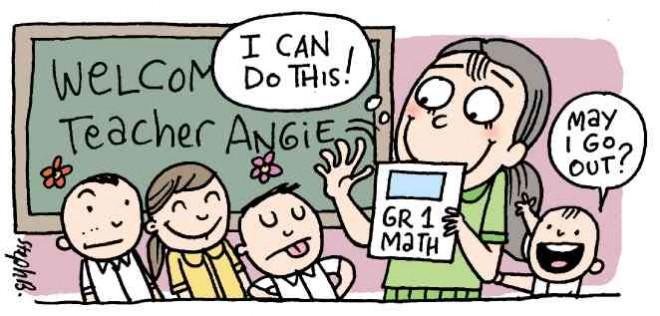How can you play basketball when you are trained to play volleyball?
Anxious that she would have to stay home jobless, high school teacher Angie Rose Requinala-Aloya took up the suggestion of her mother-in-law and her husband to apply for a position at a public elementary school.
“As a player, I have to be flexible. I have to learn to adapt to the environment and the learners I’ll be teaching,” she told a panel of interviewers who advised her it would be better if she taught high school.
But a school official challenged Aloya to do demonstration teaching in Grade 1 Mathematics.
Challenge accepted
Aloya accepted the challenge. She made the lesson plan and visual aids, despite concerns about how she could execute the plan well. She knew she had to convince the panel.
And she did. In 2012, she was hired to teach Grade 3 at Juan Sumulong Elementary School in Pasay City. This year she is teaching Hekasi (Heograpiya, Kasaysayan, Sibika or Geography, History and Civics), Filipino and Character Education to sixth-graders.
“I have learned to love teaching the elementary school grades. I think teaching kids makes me feel young again,” she said. Aloya found out that many of her colleagues also trained to be high school teachers.
Aloya majored in History at the Philippine Normal University (PNU) then tried shifting to Elementary Education but was not allowed. “I knew I would be teaching but I had always imagined myself teaching children.
I believe everything is God’s plan,” she said.
Being a teacher is expensive. “I learned how to make tarpapel, a picture or text visual made from pasted printouts,” she said.
In her first year of teaching, she handled various subjects, including Mother Tongue-based Multilingual Education (MTB-MLE).
“At the time,” she said, “the building was under construction so we had to hold classes at the gymnasium. I had to make sure not one pupil escaped.”
Affectionate students
Aloya found managing a classroom of children much easier. “Children easily show their affection. They hug you when they’re happy. High school students never do that,” she said.
“Teaching in elementary school taught me to appreciate little things my pupils did. I learned to find meaning in simple drawings that my pupils gave me. Hearing them say ‘Bye, ma’am. I love you,’ melts a strict teacher’s heart,” she said.
Apart from teaching, Aloya also coaches pupils for the Mathematics Teachers Association of the Philippines and Journalism competitions and the Science Quiz Bee.
“Teaching children is challenging because I feel I am not boxed into one subject. It enables me to teach subjects beyond my specialty. I discovered teaching English grammar was fun,” she said.
She tells her pupils to be happy that they learn something every day and not to go home without having learned anything.
Aloya said she wants to be part of her pupils’ successes. She also looks after the welfare of her pupils and checks on their school uniform and hygiene.
“Being a mother helps me teach kids. Children feel comfortable sharing with me their problems at home,” she said.
It was challenging for the former high school teacher to learn to teach and to love teaching in elementary school. But with her recent promotion to Teacher II, Aloya, who is currently pursuing a Master of Arts major in Educational Management degree at PNU, proved even someone trained to “spike” could learn to “slam dunk.”
Rudolf S. Songcayawon is a Grade 9 English teacher and Journalism coordinator at Barangka National High School and part-time English instructor at Pamantasan ng Lungsod ng Marikina.


